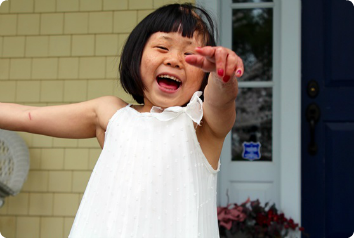 This blog was originally published on the M Health Blog from the University of Minnesota Health Adoption Medicine Clinic.
This blog was originally published on the M Health Blog from the University of Minnesota Health Adoption Medicine Clinic.
Teresa Bosch wasn’t planning to adopt another child when she first saw the photo of a 2-year-old Chinese girl nicknamed “Mei Mei” circulating on Facebook in early 2012.
The picture showed Mei Mei, who was badly burned as a toddler, using a scooter to move around at the special needs orphanage where she lived. Scar tissue from the injuries had fused the toddler’s legs in a bent position that made it impossible for her to stand or walk. But to Bosch, the photo of Mei Mei didn’t just show a badly injured child with healed burns on 60 percent of her body—it portrayed a clearly determined, spunky toddler on the go.
Bosch, who was on an international work trip at the time, forwarded the story to her husband Michael without explanation. He wrote back immediately: “Are you saying we should donate, or adopt her? Either way, I’m in.”
A blossoming life
Bosch and her husband returned from China with Mei Mei, who they named Sarah, in Sept. 2012. But before the family, who lives in Washington D.C., even accepted Sarah’s adoption referral, they had the child’s files evaluated by the care team at the University of Minnesota Health Adoption Medicine Clinic at University of Minnesota Masonic Children’s Hospital.
“The prognosis [given by the Adoption Medicine Clinic] was cautiously optimistic, and very accurate,” Teresa said. A separate review by another surgeon in the D.C. area was less reassuring. The couple chose to go forward with the adoption anyway. They soon learned that Sarah’s burn scars were contracted to a degree that few U.S. doctors had seen, and that she would benefit most from care at a highly specialized pediatric burn hospital. The no-cost care at the Shriner’s Hospital for Children in Boston, Mass., was a perfect fit.
Since adoption, Sarah has undergone multiple surgeries at Shriner’s in Boston, to reduce contractures and scarring from her burns and improve function and mobility in her hands, legs and feet. After each surgery the affected joint is immobilized for a few weeks—healing time that is followed by physical and occupational therapy. She is currently undergoing a procedure with tissue expanders in her scalp to replace much of her lost hair.
Sarah bravely tolerated the bandages, medications, stretches and restricted mobility that followed each procedure. Now, several years after her adoption, medical care and physical/occupational therapy are still a regular part of 5-year-old Sarah’s life. She also loves trying new things, attending school, ballet and gymnastics.
“Sarah is positive and outgoing,” Bosch said. “[She’s] often the ringleader bossing around her friends at school. She enjoys riding her scooter, dressing up with her big sister, and running round with the neighborhood boys. I only hope that one day her first family can see how brightly she shines!”
Tips for families considering adoption of a child with medical needs
Teresa believes the early accurate review by the M Health Adoption Medicine Clinic team helped the Bosch family anticipate Sarah’s needs and make detailed arrangements for medical care. Despite ongoing specialized care, Sarah’s long-term outlook is excellent with no significant physical disability.
For families considering adoption of a child with medical needs, Bosch has this advice:
- Medical needs can be scary on paper. Families need to be honest about their own comfort level when adopting a child with special needs, but they should remember that there is so much more to the child than the needs by which they are identified.
- Often, the unknowns are scarier than the facts.
- Families considering adoption of a child with medical needs should reach out to other families who have experience caring for children with similar needs.
- Thoroughly educate the children in your family about a new sibling’s medical needs.
- To help your new child cope with his or her own medical needs, be flexible with your expectations and ease them back into the family’s routine following surgery. Sometimes they simply need a little extra TLC.
About the Author: Blogs for M Health are created by staff and volunteers of the Adoption Medicine Clinic at University of Minnesota Masonic Children’s Hospital.


